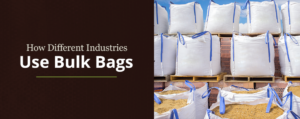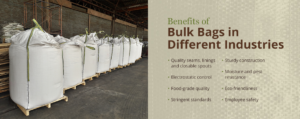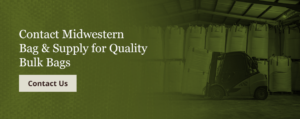
Flexible intermediate bulk containers (FIBCs), also called bulk bags, are used to transport dry bulk products such as ash, sand or flour. Bulk bags offer many distinct advantages. They are easy for machines to lift, easy to fold and store and convenient to use as storage receptacles. Some also provide safety features to reduce antistatic shock and increase employee safety. They also offer an unbeatable package-to-product-weight ratio — companies can ship a metric ton of product in a bag that weighs only about five to seven pounds.
Bulk bags have different uses across a variety of industries. Below, we’ll take a look at what industries use bulk bags, how different industries use bulk bags and what benefits bulk bags offer for each industry.
What Industries Use FIBCs?
Some of the industries that use bulk bags include:
- Agriculture: All types of flours — wheat flour, corn flour, barley flour, etc. — are ideal for transport using bulk bags, along with many other grains and dry agricultural products like coffee beans and peanuts.
- Animal nutrition: Both livestock feed and pet food are also ideal for transport using bulk bags. These dry bulk products travel well in bulk bags and can be stored in the bags when they reach their destination.
- Chemical industries: Dry, nonreactive chemical powders and other products like pharmaceuticals are also ideal for transport in bulk bags. Even hazardous materials can be transported safely if companies invest in the proper kind of bulk bags.
- Construction: In the construction industry, it’s easy to lift and transport sand, gravel, cement, resins and other materials using bulk bags.
- Food processing: Dry food products like sugar, grains, seeds, coffee beans, nuts and more are well suited for bulk bag transport.
- Mining: In the mining industry, mining products like coal, minerals and metal ores are also ideal for transport in bulk bags.
How Bulk Bags Can Help a Variety of Industries
How do businesses use bulk bags? Below are a few different bulk bag applications:
- Agricultural products: Bulk bags are exceptionally useful in the agricultural industry. Many agricultural products are destined for use in livestock feed or animal food or human consumption, so chemical-free bags that have been certified to be safe for food products make transporting these products easy and worry-free.
- Food processing: Bulk bags are useful in the food processing industry because many transported foods are dry bulk products. Bulk bags are the perfect vessels for transporting food products — many bulk bags are specifically designed for this application and are certified to be safe for transporting human food-grade products.
- Chemical industries: Products used in chemical industries can be hazardous, but bulk bags come in a variety of options for carrying hazardous materials and reducing the risk of static shock. Bags rated B through D offer different forms of protection that chemical companies can choose from depending on the requirements of their products.
- Paints and color additives: As with other chemical products, paints, coatings and color additives contain toxic chemicals. Sturdy bulk bags help contain them safely and minimize employee contact with harmful chemicals and fumes.
- Construction and mining: Bulk bags are also ideal for transporting construction materials and mining products. Successful construction projects often require huge amounts of raw materials, and successful mining operations generate tons of product. Bulk bags are strong, versatile and durable enough to get them where they need to go.
Benefits of Bulk Bags in Different Industries
How are FIBCs used to benefit different industries? Bulk bags offer an array of advantages:

- Quality seams, linings and closable spouts: For chemical, agricultural, and mining products that come in the form of powders, companies need a method of transport that ensures the fine powders will not leak out and blow away. Bulk bags help solve this problem. Siftproof seams work well in a variety of applications to ensure the security of powdered products. And in scenarios where powders are too fine for siftproof seams to be effective, bulk bag liners can line the entire inner surface of the bag to make sure even the finest powders stay where they belong. Closable spouts also help to keep fine powders securely in place.
- Electrostatic control: With some hazardous products, such as petroleum products, the buildup of static charges within a bulk bag is a serious concern because it poses grave risks to the employees who handle the bags. Fortunately, bulk bags come in different safety grades from B to D, each offering a different level of protection. Type A bags offer no protection. Type B bags, though they are not antistatic bags, can safely transport dry flammable materials. Type C and D bags provide increasing levels of antistatic protection to help protect workers.
- Food-grade quality: Not all bulk bags are manufactured to FDA food-grade quality, but those that are offer a huge boon to the food processing industry. Food-grade bulk bags ensure that food products make it to their destination safely while remaining fresh, tasty and free from chemical contamination.
- Stringent standards: In chemical industries, bulk bags offer a convenient, safe way to transport pharmaceutical products. Strict standards are in place as to how pharmaceutical products can be stored and transported. Often, these standards are just as strict or stricter than the standards for human-grade food products. Bulk bags certified to the right standard offer a safe and convenient way to ship these products.
- Sturdy construction: Heavy-duty shipping products, such as chemicals, paint products, construction products, and the metals and minerals from mining, often require the highest quality in materials and construction. If you tried to transport these products in flimsier bags, or in materials such as plastic packaging, the bags or packaging would likely tear, leak, contaminate the environment and spoil the product. Heavy-duty bulk bags that have been reinforced and certified by a third party to a certain safety factor help make sure even the most challenging products to transport make it safely to their destination.
- Moisture and pest resistance: Bulk bags are made from sturdy polypropylene, a type of thermoplastic material. A thermoplastic becomes soft and easy to mold at high temperatures but becomes solid and rigid as it cools. As a result, bulk bags are made of a protective, resistant material that keeps water out, resists mold growth and provides an effective barrier against pests. This construction is especially important in agricultural, pet food and food-processing industries, whose products are often attractive to pests and where mold growth could spoil an entire shipment of product. Polypropylene bulk bags help ensure that food products get to their destination free from mold or moisture damage and without having become a tasty snack for mice or bugs.
- Eco-friendliness: Unlike single-use plastic packaging, some bulk bags can be reused if their safety factor allows for multiple uses. Though bags that have carried certain chemical contaminants should be single-use bags, bags that have carried inert materials such as agricultural products, pet food or human food products can often be reused in other industries. This reusability helps agricultural and food-processing companies run their businesses in environmentally friendly and sustainable ways.
- Employee safety: Across all industries, employee safety is paramount. But lifting heavy bags and containers puts excessive stress on employees’ backs and joints, potentially resulting in repetitive stress injuries. Bulk bags, which hold thousands of pounds and can safely be lifted using forklifts or other equipment, help reduce these workplace injuries and keep employees healthy, pain-free and productive.
Contact Midwestern Bag & Supply for Quality Bulk Bags
When you need quality bulk bags, no matter the industry, Midwestern Bag & Supply has you covered. We design and manufacture all types of bulk bags, all made of 100% polypropylene for the best in sturdiness and product protection. Many of our bags are reusable, offering a premium 6:1 safety factor, so you can rest assured that you’re doing something good for the environment when you use them, as well as for your company and the safety of your employees.
Contact us today, or request a quote online.



 Copyright © 2025 Midwestern Bag. All Rights Reserved.
Copyright © 2025 Midwestern Bag. All Rights Reserved.